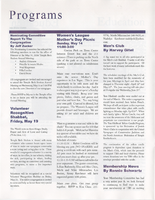Search the Special Collections and Archives Portal
Search Results
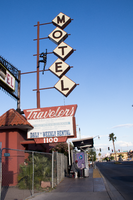
Photographs of Travelers Motel sign, Las Vegas (Nev.), 2017
Date
Archival Collection
Description
Site address: 1100 Fremont St
Sign details: This location was constructed in 1926. Though the year of when the Traveler's Motel opened in unknown though its sign states, "Your Best Bet In Las Vegas Since 1936'. Though Vintage Las Vegas' blog states that the Traveler's Motel acquired some of their land from the Lucky Motel. Currently the Traveler's Motel is closed and gated up.
Sign condition: 3, the sign is fairly in condition. However, the sign does not light up at night. The sign that used to read "Traveler's Motel" that was affixed to the iron gate-like structure appears to have the majority of its sign taken down or destroyed in recent times.
Sign form: Blade Pole sign and Porte Cochere
Sign-specific description: This sign is attached to the building that belongs to and extends outward to Fremont Street. The lower portion of this sign has the same details on each side of the sign. The top portion of this sign is a trapezoid with "Traveler's" painted on it in a cursive text except for the "t." This is done in white on a rust colored background. Neon is also affixed to "Traveler's." Underneath this is a plastic back lit sign detail the various accommodations of the property, such as: phone, cable T.V., microwave, refrigerators, "totally remodeled rooms," "daily * weekly rental," and "Your Best Bet In Las Vegas Since 1936." Under this is another, smaller trapezoid that has the street address painted on it in bold white numbers with a rust background. Extending from the top portion of this sign is a rust colored pole that has five other poles with various lengths extending out from that towards Fremont Street. Attached to these poles are letters that spell out "MOTEL," the top supports the "M" and each pole following hold each of the others letters to spell out the word. Each of these are diamond shaped plastic, possibly back lit signs. The plastic is off-white and each of the letters is black. The marquee sign attached to the iron gate-like structure that connects one side of the building to the next. This sign is a long, rectangular back lit sign that has a white background and bold red text reading "Traveler's Motel. " This sign also was attached to an longer, yellow rectangle with rounded sided on the left and right side of the sign.
Sign - type of display: Neon, possibly back lit (sign doesn't light up any more)
Sign - media: Steel and Plastic
Sign - non-neon treatments: Plastic back lit portion
Sign animation: The sign is no longer in use; therefore, it is difficult to determine this. There is also no record of the sign having any animation.
Sign environment: This property resides in the area east of the Fremont East District with many new businesses surrounding it, such as: PublicUs, the Bunkhouse Saloon, Chow, The Writer's Block, and 11th Street Records. However, there are quite a few other closed Motel properties that reside near the Traveler's Motel as well.
Sign - thematic influences: The sign is extremely reminiscent of many of the signs from the 50's and 60's that belong to the other motels in the downtown area. The sign has many geometric elements to it that make it appear that it could be from this time period.
Sign - artistic significance: This sign does not have a specific theme to it. However, the plastic figure climbing on the sign stresses that this motel would be for those who do enjoy traveling and adventures. This sign does follow a very basic trend regarding motel signs on Fremont Street. It is attractive and very noticeable to those moving along Fremont Street. The overall design of the sign is very geometric, which is a common aesthetic among signs made in the 50's and 60's.
Survey - research locations: Assessor's Page and Vintage Las Vegas website http://vintagelasvegas.com/search/Traveler+Motel
Survey - research notes: It was difficult to find any history or old photographs of this property.
Surveyor: Lauren Vaccaro
Survey - date completed: 2017-08-18
Sign keywords: Neon; Steel; Plastic; Backlit; Pole sign
Mixed Content
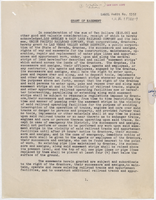
Grant of easement, Las Vegas Land and Water Company, Audit No. 5352, June 1, 1954
Date
Archival Collection
Description
Granting of an easement by the Union Pacific Railroad to the Las Vegas Valley Water District for the purpose of maintaining the water supply facilities. Notarized by Louis Scholnick in Douglas County, Nebraska on June 3, 1954.
Text
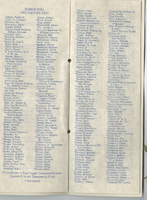
LVCJA Ball programs and planning documents, item 02
Description
Program for the Silver Anniversary Ambassador's Ball at Caesars Palace in Las Vegas, Nevada.
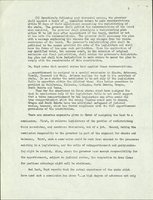
Summary report by the League of Women Voters on Legislative Reapportionment, "The Nevada Reapportionment Decision," October 1965
Date
Archival Collection
Description
League of Women Voters statement on legislative reapportionment and redistricting in Nevada.
Text

Meeting minutes for Consolidated Student Senate, University of Nevada, Las Vegas, February 26, 1974
Date
Archival Collection
Description
Text
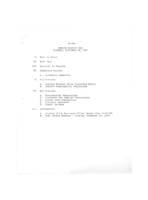
Meeting minutes for Consolidated Student Senate, University of Nevada, Las Vegas, November 12, 1974
Date
Archival Collection
Description
Text

Interview with Oscar Foger, May 5, 2005
Date
Archival Collection
Description
Text

Transcript of interview with Jane Greenspun Gale by Barbara Tabach January 31 and February 9, 2018
Date
Archival Collection
Description
Jane Greenspun Gale-actor, activist, writer, magazine publisher, philanthropist, and farmer- has filled her life with accomplishments such as the Animal Foundation and Springs Preserve. It has also been a life filled with adventure - from “looking for John Lennon” during her time living and studying acting in London to learning to raise chickens on the acres of the Gilcrease Farm she owns with husband and photographer Jeff Gale. Everyone calls her Janie. Born Jane in 1949, she is the third of four children born to community leaders Barbara and Hank Greenspun. In this oral history, Janie captures the fun of growing up in Las Vegas under the watching eye of Hank. As a teen she and her friends cruised Fremont Street. Several years later she wanted to be arrested protesting the Atomic Test Site, when Hank diverted her into reporting about the event instead. Her Jewish foundation was at Temple Beth Sholom, where her parents were among the founding members. As the Jewish population grew, the tastes in synagogues grew to reflect the change. When Janie’s children preferred the Reform approach at Congregation Ner Tamid, a new family tradition began. She is proud of her background and shares loving stories of time spent with her grandparents as a child and pride in the heroic and dramatic story behind the naming of Hank Greenspun Plaza in Israel. Even her love story with Jeff is a tale made for movies. It unfolds in this engaging oral history interview along with anecdotes that are plucked from her personal history and preserve a reflection of growing up in Las Vegas, one of the Greenspun family of local fame.
Text

Transcript of interview with Ray Keith by David Alexander, March 3, 1980
Date
Archival Collection
Description
On March 3, 1980, David Alexander interviewed community volunteer, Ray Keith (born October 1st, 1911 in Montgomery, Alabama) in her home in Las Vegas, Nevada about her life and memories of Southern Nevada. The two discuss how Keith first arrived in Las Vegas and the addresses that she has lived at. The interview concludes with Keith explaining how she helped to charter the “Home of the Good Shepherd” housing facilities with local Las Vegas women in the sixties.
Text

